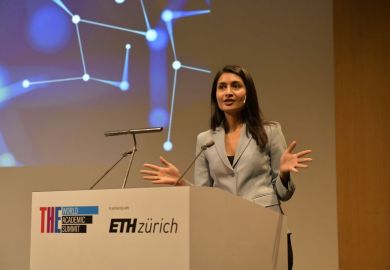Artificial intelligence experts have highlighted that a lack of diversity in the field is stifling progress in many developing countries, but claimed that universities can leverage their power in the discipline to push back against policy restrictions on the movement of scientists.
Moustapha Cissé, head of the Google AI Centre in Accra, Ghana, said that conversations around AI and diversity tended to focus on the “biases that algorithms may have”, but this was not the most damaging result of a lack of different perspectives in the field.
“The most important damage we’re seeing here is the lost opportunities to solve important problems that would have been solved if we had involved more people with different perspectives,” Dr Cissé told the Times Higher Education World Academic Summit at ETH Zurich.
Speaking during a panel discussion on the impact of AI and reversing brain drain, Dr Cissé cited autonomous vehicles as an example of an area where a lot of work was being done but that would have a relatively small impact.
“How many countries would you look at and consider that self-driving cars are a thing or will be a thing in the next 50 years?” he asked. “It’s very important in North America, it might be important in some countries in Europe; and because there is a concentration of talent in Silicon Valley in the US and trucks are important...they end up building self-driving cars.
“But in other parts of the world there are really important challenges that deserve similar attention, if not more, that are lost opportunities, because people haven’t acquired the right skills to tackle their own problems...How do we make sure that the outcomes of the great research that is done is available to everyone?”
Dr Cissé also told the conference that he did not believe brain drain exists in science, claiming that such a notion “assumes that brains belong to somewhere geographically” and that the “knowledge economy is a zero-sum game”.
“I think scientists should be where they are most impactful to the whole of humankind. When scientists have produced great work that has lasting impact on humanity, over time we forget where they are from,” he said.
Sophie-Charlotte Fischer, a PhD candidate at the Center for Security Studies at ETH Zurich, agreed that AI talent should ideally not be too concentrated in certain countries or regions of the world.
“AI can have immense benefits but it will also have challenges and it’s very important that we don’t foster inequalities through the distribution of these types of resources in different countries and different regions,” she said.
Ms Fischer added that the majority of AI researchers in the US were foreign, mostly from China, and she was particularly worried that “we’ll see more barriers being put up for these talents to move around and to move to different areas” as a result of the current hostility between the two nations.
However, she said that Europe could use this opportunity to “stay strong and stay open to people coming from all parts of the world to work on AI”. It was also “quite positive” that a lot of research in the area of AI has been published in open source format, which helped to prevent a concentration of talent, she added.
Ms Fischer also suggested that the increasing importance of AI could give universities leverage to push back against policy proposals that attempt to restrict the movement of scientists.
“What universities have to realise is, especially when we look at AI, they have an increasingly important asset and important resources that are of great interest to governments. What universities can and should do is to really use this power and push back against certain policy proposals that would change, for example, the freedom of researchers to move from one place to another, to restrict the number of researchers from a certain country,” she said.
Register to continue
Why register?
- Registration is free and only takes a moment
- Once registered, you can read 3 articles a month
- Sign up for our newsletter
Subscribe
Or subscribe for unlimited access to:
- Unlimited access to news, views, insights & reviews
- Digital editions
- Digital access to THE’s university and college rankings analysis
Already registered or a current subscriber?








